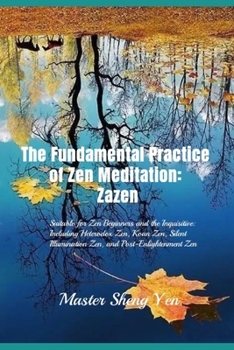The Fundamental Practice of Zen Meditation: Zazen: Suitable for Zen Beginners and the Inquisitive: Including Heterodox Zen, Koan Zen, Silent Illuminat
Hui-neng (638-713), who succeeded Hung-jen as the Sixth Patriarch, was not an advocate as sitting as the path to enlightenment. With him, we have a distinction between tso-ch'an which attains enlightenment through sitting, and tso-ch'an which attains enlightenment without sitting. Hui-neng had a different interpretation of what tso-ch'an means. He said that when there is no mind, or no thoughts arising, that is called "sitting" (tso). When you see internally that the self-nature is not moving, that is Ch'an.
This was different from the sitting tso-ch'an of Bodhidharma. The Sixth Patriarch took his inspiration from the Samadhi of One Act, described in the Manjusri Sutra mentioned above. The method is to put your mind steadfastly on the One Dharma Realm, in which there is no differentiation into forms. Quoting from the Vimalakirti Sutra, he also said, "The straightforward mind is the Path." Its meaning is that all forms are equivalent to one form. Any time, any place, whether walking, standing, sitting or lying down, there is no situation that is not an opportunity to practice tso-ch'an. In this view sitting was not only not necessary, but could be a hindrance.
Related Subjects
Philosophy




